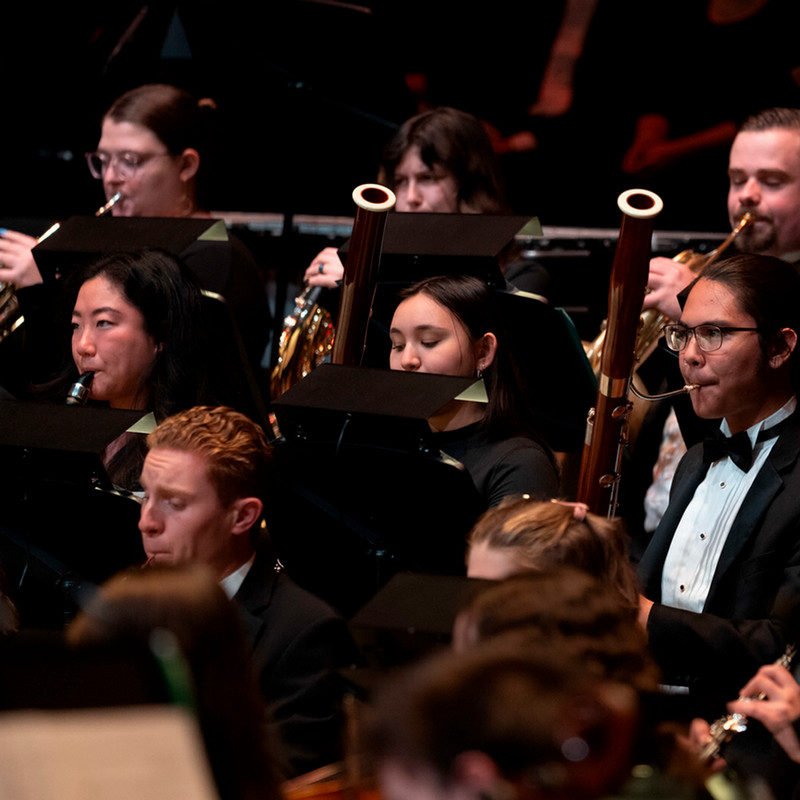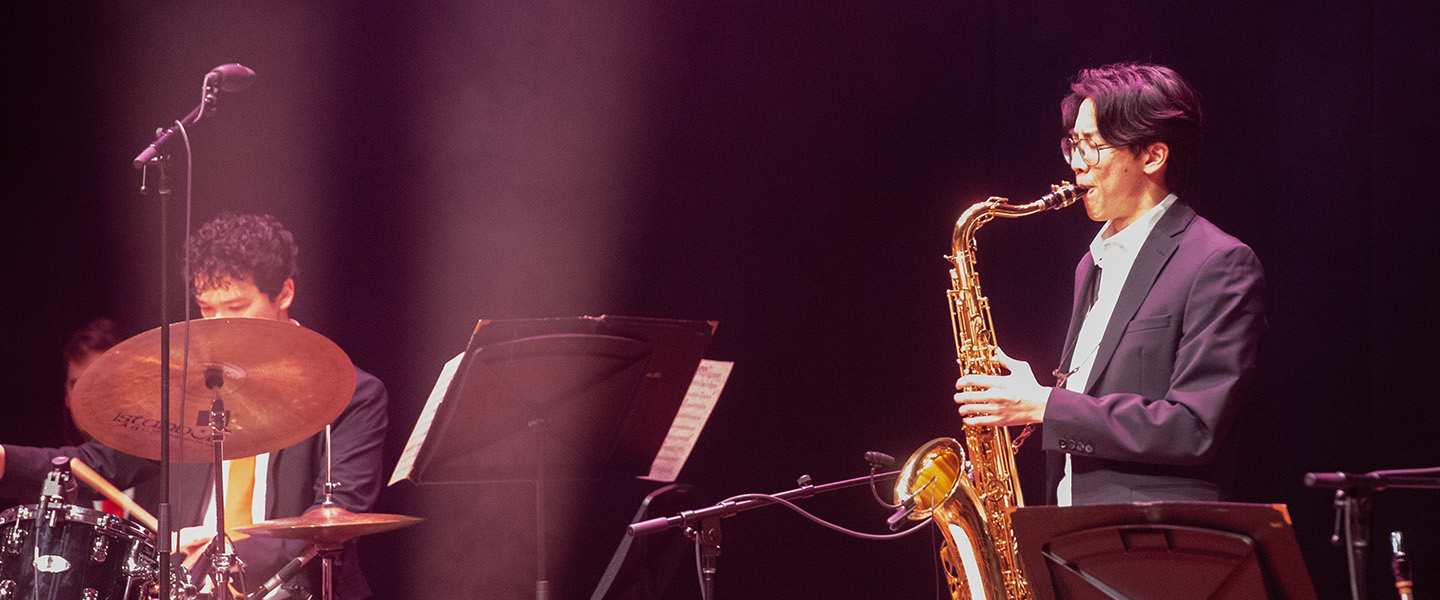Why Study Multiple Woodwinds?
Belmont's Master of Music in Multiple Woodwinds is taught by expert faculty and will provide the hands-on opportunities students need to hone their craft.
In this program, students will have the opportunity to gain skills on their secondary instruments and perform in state-of-the-art performance halls across Belmont's campus and beyond. With an interdisciplinary focus on instrumental growth, this opens up a realm of possibilities for future career paths. It also allows students to participate within multiple ensembles and does not limit them to one specific section or instrument. The ability to perform at the professional level across multiple instruments is valuable, and the Multiple Woodwinds program prepares students to become highly sought after musicians for this reason.
What You'll Learn
- Music research tools, materials and techniques.
- The analysis of music from across a range of genres and styles. In addition to traditional harmonic and formal analysis, a variety of techniques will be explored and may include LaRue style analysis, analysis of rhythm and meter and an introduction to Schenkerian and related linear-reductive systems.
- Current methods and literature, instructional techniques, philosophical bases, curriculum building and administration of the teaching of applied music.
- Advanced skills on your primary instrument
- Private instruction on your non-primary instruments, enabling you to become proficient on multiple instruments
Program Details
View all program requirements.
- Introduction to Music Research: Introduction to music research tools, materials, and techniques. The focus of the course will include major references and indexes, database and internet research. The course will be relevant to all majors and will encompass both quantitative and qualitative research. A research project relating to the student’s major will be required.
- Music History Seminar: A series of in-depth topical seminars for graduate music students which will cover a wide range of periods, composers and musical genres. Prerequisites: MUG 5010 or passing score on Graduate History Placement Exam.
- Analytical Techniques: Advanced study in the analysis of music from across a range of genres and styles. In addition to traditional harmonic and formal analysis, a variety of techniques will be explored and may include LaRue style analysis; analysis of rhythm and meter; and an introduction to Schenkerian and related linear-reductive systems. Prerequisites: MUG 5020 or passing score on Graduate Theory Placement Exam.
- Culminating Project/Examinations: MUG 6000 includes the terminal requirements for the M.M. degree. All students are required to successfully complete comprehensive written and oral examinations and a culminating project which varies, depending on the student’s particular track. Options and requirements for each culminating track are described in Guidelines for the Master of Music Degree accessed through the Belmont University Portal. Students should register for the course during their final semester of enrollment. The class is graded pass/fail. Prerequisites: Student must have achieved Candidacy status.
- Graduate Ensemble Studies: Graduate students may participate in an approved School of Music ensemble. Prerequisites: Permission of ensemble director and instructor required.
- Introduction to Pedagogy of Applied Music: Introduction to Pedagogy of Applied Music will provide an overview of the current methods and literature, instructional techniques, philosophical bases, curriculum building and administration of the teaching of applied music. The focus will include both pre-college and undergraduate college levels and both individual and class teaching situations.
- Private Applied Instruction on Primary Instrument of Flute, Oboe, Clarinet, Bassoon or Saxophone: (8 credit hours total earned over 4 semesters)
- Private Applied Instruction on Non-Primary Instrument of Flute, Oboe, Clarinet, Bassoon and Saxophone: (8 credit hours total earned over 4 semesters)
You'll have a variety of opportunities in Belmont's Master's of Music in Multiple Woodwinds program including:
- Participating in ensembles with other students passionate about music
- Performing in state-of-the-art performance halls
- Joining a thriving and creative musical community in Nashville
National Association of Schools of Music (NASM)
1. Apply to the University
- Create a BU4U account
- Complete the Belmont University Graduate Studies Application for Admission
- Pay the $50 Application Fee
2. Submit Supplemental Materials
Once your application is submitted and the application fee is paid, you will receive an email with instructions on how to submit the supplemental pieces of the application. You will be required to provide the following:
- Two completed recommendation forms from individuals who know the applicant's musical abilities. At least one recommendation must be completed by an individual who can address the applicant's accomplishments and potential in the academic classroom setting.
- A list of repertory studied in the principal performing area, including undergraduate junior and senior recital repertory, if applicable.
- A writing sample from undergraduate academic course work.
- Statement of Purpose. This one-page essay should describe why you are interested in the desired degree program and Belmont University, and address your personal and professional career goals.
- Official transcripts of all previous college and masters level work. International applicants with college level coursework from foreign institutions must have their transcripts evaluated by a credential evaluation service such as World Education Services ( wes.org). Applicants must have a minimum of a 3.0 cumulative GPA. Students who have earned below a 3.0 may be considered on a case-by-case basis.
3. Submit Prescreening Materials
In addition to the listed supplemental materials, all applicants are required to submit prescreening materials for their degree of choice. The materials you submit to Acceptd will be reviewed as your prescreen materials, and not your formal audition. An email will be sent with instructions for submitting these materials via our prescreening platform, Accept’d. The prescreening process is as follows:
- Submit the University application and pay the application fee; instructions are then sent detailing how to submit prescreening materials.
- Create an account via our prescreening platform, Accept’d,
- Upload required prescreening material by the deadline that corresponds with your intended audition date. Deadlines and requirements are listed below.
- If the prescreening is passed, register for a live audition date.
Video/audio editing, mixing, or re-mastering of any kind is not permitted for prescreening submissions. Any materials received that have been altered will result in an automatic denial.
Prescreening results will be released in rounds that correspond with the prescreening deadlines. Results may be released earlier, but are guaranteed to be released within two weeks of the deadline.
4. Audition for the School of Music
All applicants are required to audition for the School of Music. The audition day will consist of a live audition and interview with our faculty. The interview will also allow time for questions from attendees.
An audition registration email will be sent upon receipt of the application, all supplemental materials, and passing through the prescreening.
Prescreening Requirements:
- Include a video recording of two pieces; one piece on the applicant's primary instrument, one piece on the applicant's secondary instrument. The recordings should:
- Demonstrate the applicant's best work by highlighting musical ability and technical training.
- Demonstrate the applicant's knowledge of and potential for success in the program.
- A list of repertory studied in the principal and secondary performing area, including undergraduate junior and senior recital repertory, if applicable.
- A resume detailing additional experience that indicates the applicant is qualified to pursue the program.
Audition Requirements:
- Perform one (1) significant work on the applicant's primary instrument from the standard classical repertoire (i.e.: a concerto movement, sonata movement, or solo de concours).
- Perform a standard classical solo work for two other of the following instruments: flute, oboe, clarinet, bassoon, and saxophone.
All scholarships will be distributed based on the strength of the audition. All applicants are considered for scholarships.

Career Possibilities
- Theatre Pit Musician
- Applied Lesson Teacher
- Studio Musician
- Performing Musician with groups such as big bands and jazz orchestras
Request Information
Contact Us
College of Music & Performing Arts
Angela Stenzel
Graduate Admissions Coordinator
(615) 460.8307
Email Angela


